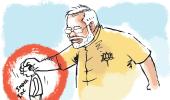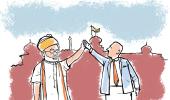'Businessmen like Rajiv render public service when they speak truth to power,' observes Virendra Kapoor.

Whoever persuaded him to rope in eminent persons from different walks of life for video conversations -- and then put them out on a social media platform -- wanted to try and correct the public perception about Rahul Gandhi.
To be seen talking 'intelligently' with Nobel Laureates and well-known economists, it was hoped, the former and future president of the Congress Party would be able to shake off the popular image of being a Pappu, which critics in his party and outside had foisted on him.
Admittedly, most of what his interlocutors said was largely on expected lines, which the Gandhi scion seemed readily to be in agreement with. It may be because those were generally seen to be in his corner and critical of the Modi government.
But one man who made headlines for what he said was Rajiv Bajaj.
The managing director of the Pune-headquartered Bajaj Auto lived up to his reputation, mincing no words in describing the lockdown as a huge infliction on the country which had 'flattened the GDP curve, brought the economy to a standstill and caused untold misery to the ordinary people.'
Coming from a top industrialist the critique of the government's handling of the coronavirus pandemic was brutally frank as well as refreshing.
We need more Rajiv Bajajs in our boardrooms, more to break the pernicious nexus between crony capitalists and corrupt politicians.
Businessmen like Rajiv render public service when they speak truth to power.
Such candidness actually helps far more than syrupy words drummed into the ears of ruling politicians by self-seeking vested interests.
Like his illustrious father, Rahul Bajaj, who has never held back, speaking his mind on men and matters unmindful of the consequences in a country where politicians notoriously have particularly thin skins, Rajiv was blunt in criticising the 'hard and draconian shutdown' of the country and insisted that the people need to be told whether it did more harm than good.
He himself had no doubt it did much harm.
But what he said about the state of the economy does ring true.
Slowdown seems irreversible at least in the near future.
Basically, the reason is two-fold.
One, lack of domestic demand and, two, a slowing global economy.
In fact, we are fortunate to have crude oil prices ruling at historic lows. Otherwise, the fiscal situation would have been worse.
But we are still to overcome the coronavirus challenge.
Despite the relaxation in the lockdown, or more likely because of it, the number of infections is rising daily.
Mumbai, the financial capital, and Delhi, the political capital, are both in a particularly severe grip of the virus.
State governments in both metropolises seem unable to cope with the challenge.
With millions of migrant workers trekking back home, such industries which may be in a position to restart are handicapped by the lack of enough working hands.
The sharp rise in demand for work under the national rural employment guarantee scheme shows the changed mood of the unskilled working-age population.
It would rather earn less but try and stay closer to its native place than move thousands of miles away in search of work.
And thus face unforeseen crises such as the one the pandemic shut-down of the economy has inflicted upon them.
There is a psychological comfort being close to one's near and dear ones even if the income is relatively meager.
Not that the economic conditions in urban centrs are much better.
Despite the reopening, markets wear a deserted look, the fear of the virus and the uncertainty of assured income has choked demand.
People are conserving their savings. Discretionary spending is out.
The downgrade of the country's sovereign debt rating by Moody's further confirms the economic downturn.
Despite an unprecedented level of liquidity sloshing around in the economy, there are hardly any borrowers.
Investors are dissuaded by the adverse business environment.
The promise of land, labour and other long overdue reforms in the so-called economic salvage package do not impress investors.
They will trust when these are actually done. Evidence of those being done is absent thus far.
In such bleak conditions, government spending alone can spur growth.
However, fiscal conservatism has gripped the government.
Treating reasonably low fiscal deficit as the Holy Grail of its economic policy, in spite of the unprecedented fall in growth, the Government still refuses to expand public spending.
Even if the debt to GDP ratio rises from 70% to 84%, the policy-makers will know that all major economies has far higher ratios.
The US and the Chinese debt is well above 100 percent of their GDPs.
Ditto for the UK.
However, the Japanese take the cake, having notched up a debt to GDP ratio above 225% and still loosening the purse strings to ease the strain of the pandemic.
Again, the Make In India pitch is misdirected.
It can only to add to the economic woes.
For instance, it makes little sense to try and set up manufacturing facilities for air-conditioners and TVs, and such like household goods when these can be relatively cheaply sourced from foreign manufacturers.
India cannot grow by focusing on what can only be termed as a screwdriver economy.
Protectionism will be painful for consumers.
We cannot become a hub for global manufacturing a la China as long as our land, labour, energy and laws continue to be adversarial towards foreign investment.
Let us not delude ourselves.
We are essentially a service economy. Let us find ways to enhance our attraction to the world in the IT sector.
And if the government is still sold out on Make In India, it should prove its credentials by making the costs of land, labour and energy as competitive as in China.
Slogans do not sway hard-nosed investors. Conditions on the ground do. And those conditions are set to become worse before they get any better.
The economy will remain in deep funk in the foreseeable future.
Indians will have to tighten their belt further.
Production: Aslam Hunani/Rediff.com











 © 2025
© 2025